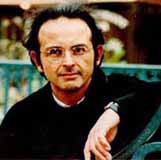Unity of Observer and Observed
Francisco Varela, 1989
 When
we examine the processes of cognition and knowledge and we use computer
metaphors, we are actually missing what is the most interesting part of
cognition.
When
we examine the processes of cognition and knowledge and we use computer
metaphors, we are actually missing what is the most interesting part of
cognition.
Firstly, the fact that whatever it is that we know, it is not separate from what we do to know it. There is that inseparability between knower and known which is not at all what happens in an engineering perspective, where the machine is supposed to know what you expect of it.
Secondly, the key is the question of creativity. For an animal, or a living being, the world is something that he actually shapes and creates in evolution and in its own history. It is not something that is given.
These two questions are fundamental and unique to living beings. In that sense, biology holds the key to the understanding of cognition. I am completely convinced of that and I think the field is slowly recognizing that, too.
Excerpt
from interview by Louwrien Wijers in the book Art Meets Science and Spirituality
in a Changing Economy, SDU publishers, Amsterdam, 1990
[Francisco Varela (Santiago, September 7, 1946 – May 28, 2001 in Paris) was a biologist; director of research at the Centre National de Recherche Scientifique, and professor of cognitive science and epistemology at the École Polytechnique, in Paris; author of Principles of Biological Autonomy; coauthor with Humberto D. Maturana of Autopoiesis and Cognition: The Realization of the Living and The Tree of Knowledge, and with Evan Thompson and Eleanor Rosch of The Embodied Mind.]